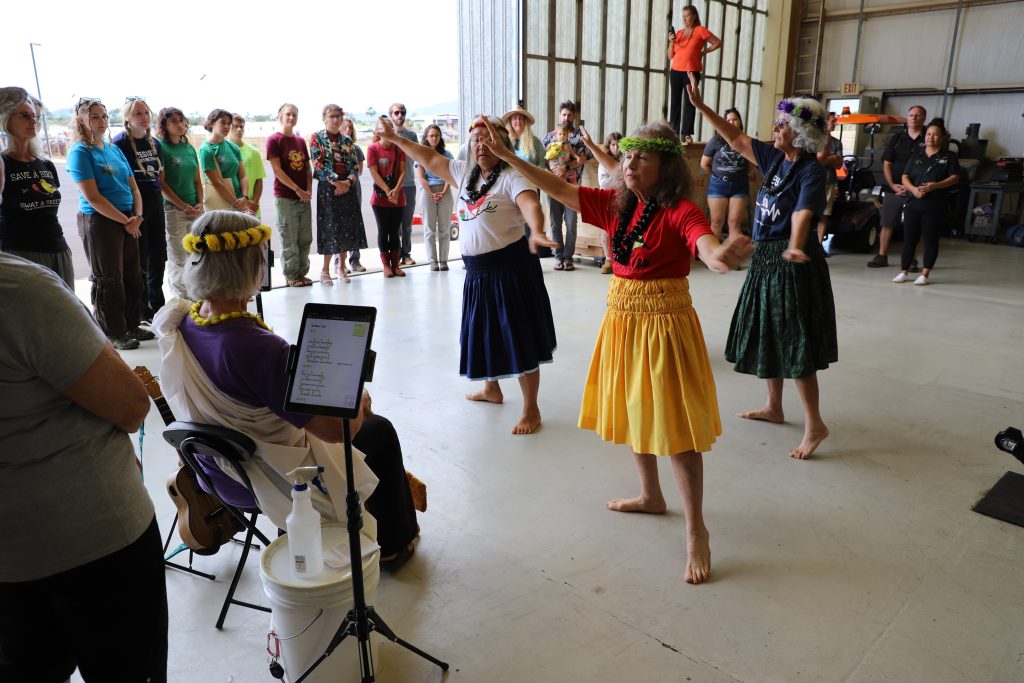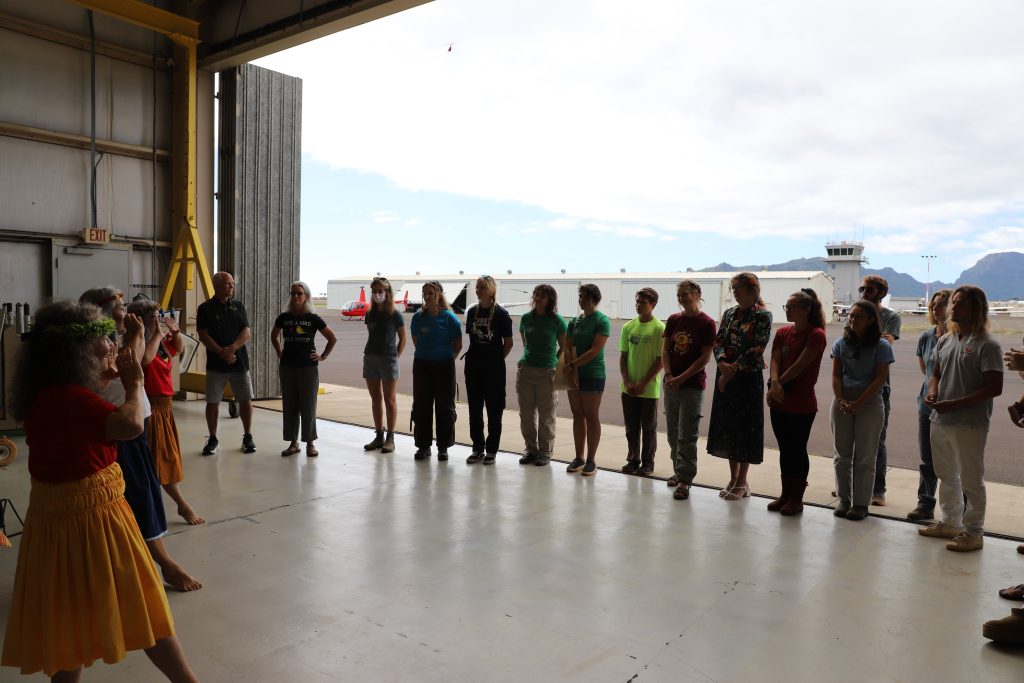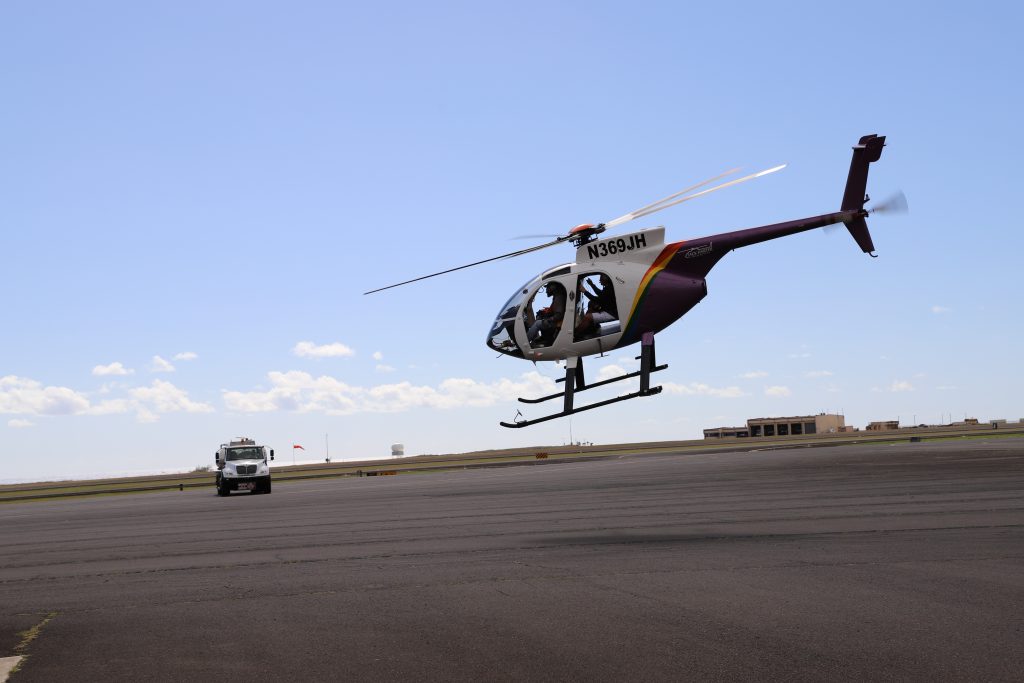Blessing the ‘birds’ critical to saving Kauaʻi forest birds
In a hangar on the north end of the Līhuʻe International Airport, more than two dozen people gathered on Monday to bless the beginning of another field season.
Typically, the annual blessings are conducted at Kōkeʻe, near the Alaka‘i Plateau where, for nearly 20 years, staff from the Kaua‘i Forest Bird Recovery Project have worked to save the island’s native forest birds from extinction.
Dr. Lisa ‘Cali’ Crampton leads the Kaua‘i Forest Bird Recovery Project and says she has a real-world vision of how critical helicopters are to the mission.
“When we started doing all the work we do in the Alaka‘i the only air support we had was to get our food and our really heavy supplies in and out of the Alaka‘i, and we did all the rest of the things we needed to do on foot,” Crampton said.
That involved commuting on foot over arduous terrain. Crampton says that took a major toll on workers and it reduced the time they spent in the field working with birds. She added, “Working with our partners to find the budget that we needed to be able to increase the amount of air support we have for our operations has been critical.”
Justin Hite, formerly with the Kaua‘i Forest Bird Recovery Project, but now working as a planner with the DLNR Division of Forestry and Wildlife, said, “physically, just getting to the different spots where the work’s going to take place is a two-hour drive, plus a seven-hour hike. To do the work in a productive way you’ve got to have air support.”
According to the Division of Forestry and Wildlife, helicopters will be especially indispensable this field season for a two-pronged mosquito control effort in Kaua‘i’s mountains, where forest bird populations have been decimated by the advance of avian malaria from lower elevations due to global warming.
Beginning next week, helicopters will begin dropping cones full of male mosquitoes that are incompatible with local females so their matings are inviable, thus reducing their population. For the past year teams have also used choppers to spread a biological larvicide, which is targeted bacteria to eliminate mosquito larvae in standing water.
“In the past we’ve tried to reduce populations with hand treatments and it’s like finding a needle in a haystack trying to find every little water source there is in the Alaka‘i Plateau because essentially it’s a swamp,” Crampton said.
Thirdly this season, helicopters will serve as a kind of intensive neo-natal care transport for the eggs of ‘anianiau, birds endemic to Kaua‘i, as the team begins a conservation breeding program for the species to serve as an insurance population. “If we can’t get those eggs out in a timely fashion by helicopter, the program won’t work because it’s too dangerous and too time consuming to hike tiny little eggs out, Crampton explained.
Hite and his 18-month-old daughter watched members of Ka ʻImi Naʻauao O Hawaiʻi Nei Institute perform ‘oli and chants to bless the upcoming field season. He said his daughter loves helicopters. “As soon as we pulled up here to the airport there were about five or six flying at once and she was spinning in all directions. She doesn’t call them helicopters yet. I think she calls all flying birds and other flying things ‘nēnē,'” Hite joked.

Staff from Jack Harter Helicopters joined the blessing. “It’s just been a great teamwork kind of thing. We just appreciate having you guys around, because you may know it or not, but Jack Harter died a few years ago,” said the company’s special projects director Casey Riemer.
“The first time I went flying with [Jack], he talked about the birds in his narration. Talked about how they’re worried about the temperature rising high and the mosquitoes getting up there. So, now we’re doing something to help keep it from going further,” he added.
The company’s website even includes a tab where customers can donate to the cause. Full circle indeed.


















